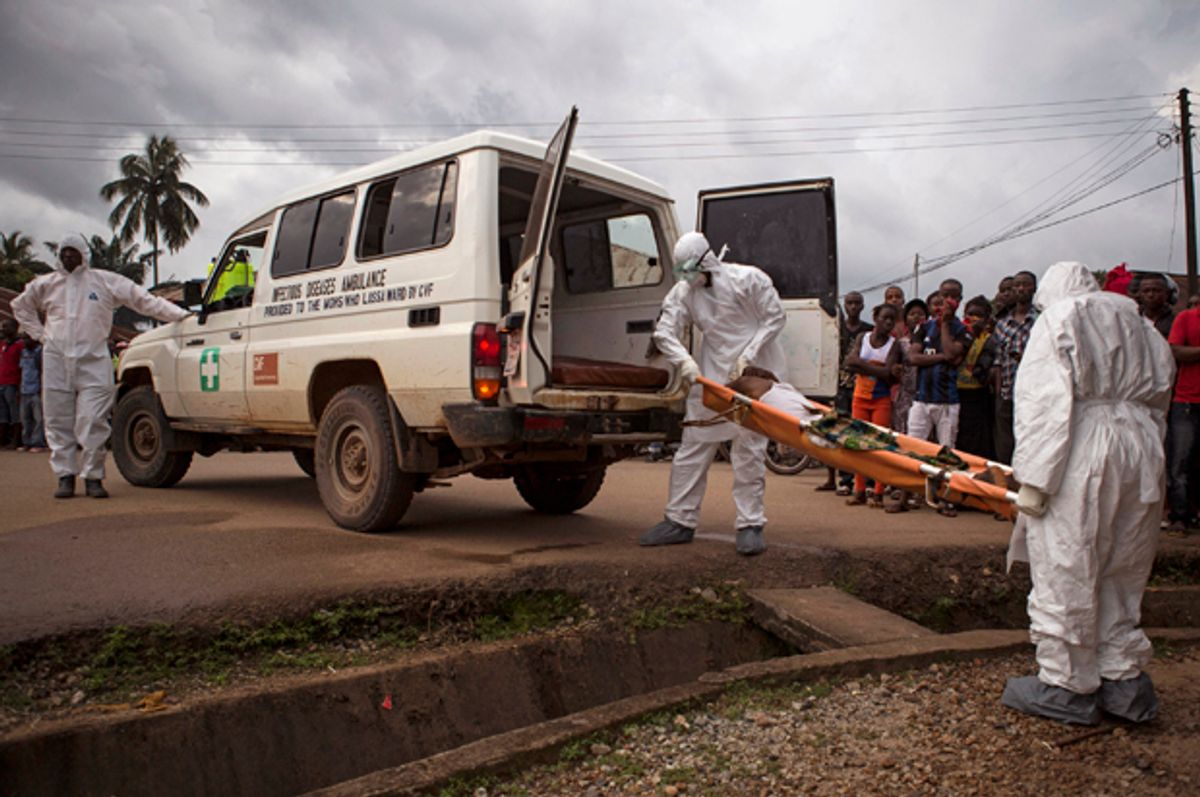 Hospitals in the United States aren't prepared for Ebola.
Hospitals in the United States aren't prepared for Ebola.
Not what you want to hear right now, of course, but that's the warning being sounded by the very medical professionals who provide much of our healthcare and who'd be on the front lines of any Ebola outbreak in the United States: Nurses.
Channeling anxiety in appropriate ways has been an ongoing struggle as the world faces the worst Ebola outbreak in history. The virus has infected more than 8,000 people and killed more than 4,000 in West Africa, and the Centers for Disease Control (CDC) thinks it could infect between 550,000 and 1.4 million people by January. With a mortality rate of more than 50 percent in the current outbreak, that's some very, very scary math.
If you live in Liberia, you are surrounded by a horror that the rest of the world can barely imagine, and you have cause to be freaking out. If you live somewhere else, it's harder to know how you should feel.
In the United States, amid rising anxieties, public health authorities have spent months telling the American public that there's no chance of an Ebola outbreak in the United States. For one thing, Ebola had never been diagnosed on American soil. That was rather comforting, until it wasn't true anymore, when Thomas Eric Duncan, a Liberian man who'd flown to Texas to visit family, was diagnosed with Ebola in Texas and later died on Oct. 8.
Still there was the United States' advanced medical infrastructure to keep us safe. US President Barack Obama emphasized that point via a statement to Texas officials:
"Because we’ve got a world-class medical system, because we’ve put in place tough safety measures, because of the work that many of you have done in conjunction with organizations like the CDC and dealing with infectious disease generally, and because of the nature of Ebola and the fact that it’s not something involving airborne transmission, the chance of an Ebola outbreak in the United States remains extremely low."
With so much resting on this world-class medical system, it's understandably worrying to learn that one of the nurses who treated Duncan has been diagnosed with Ebola.
You've got to ask in this situation: If our medical system is so prepared to handle Ebola cases — as the CDC, public health experts, and government leaders have insisted over and over again — how could that possibly happen?
Basically, there are two stories. You can choose which sounds more plausible to you.
The first story comes from Thomas Frieden, director of the CDC, who explained that there'd been a "breach of protocol" in the Dallas hospital. Translation: everything is fine, we have protocols established, healthcare workers are trained, hospitals are prepared. This nurse, therefore, must have screwed up.
Nurses, on the other hand, tell a second, much different story — one that's not about a single person's mistake, but rather, about a nationwide failure to prepare health workers to treat Ebola patients.
Now National Nurses United (NNU), the largest professional organization for registered nurses in the United States, is getting that story out there.
"You don't scapegoat and blame when you have a disease outbreak," the NNU's Bonnie Castillosaid. "We have a system failure. That is what we have to correct."
The system failure is primarily a failure of training. It's a tendency for hospitals, for example, in lieu of training, to "post something on a bulletin board referring workers and nurses to the CDC guidelines," as Castillo says. It's the absence of a national training program and limited contact between US health workers and experts who've actually treated Ebola patients,according to Dr. Gavin Macgregor-Skinner, a public health expert at Penn State.
The NNU has heard these things from nurses around the United States. The organization surveyed 2,000 member nurses at 750 facilities in 46 states. The responses were astonishing.
Some findings:
- 79 percent of nurses said their hospitals hadn't communicated a policy regarding Ebola
- 85 percent said they hadn't been provided information about Ebola in a setting where they were able to ask questions (see bulletin board tendency)
- 36 - 37 percent said their hospitals lacked sufficient supplies for eye protection and fluid resistant gowns
- 8 percent were aware of defined plans for disposal of materials
Your response right now should be something like — "Are you kidding me? I thought the CDC had this!"
No need for full-blown hysteria, but these numbers are definitely cause for alarm. And the story they tell accounts for how one nurse in Dallas contracted Ebola from the first Ebola patient her hospital ever treated.
Luckily, there's time for the US public health establishment to correct course. Emergency funds for the CDC and the National Institutes of Health (NIH) — both hit hard by budget cuts —could help pay for equipment, training, and research.
The NNU is also embracing more local demands to help hospitals prepare for Ebola and protect the health workers responsible for fighting it:
- Full training of hospital personnel, along with proper protocols and training materials for responding to outbreaks, with the ability for nurses to interact and ask questions.
- Adequate supplies of Hazmat suits and other personal protective equipment
- Properly equipped isolation rooms to assure patient, visitor, and staff safety.
- Proper procedures for disposal of medical waste and linens after use.
Listen to the nurses. They tend to know what's best for you.



Shares